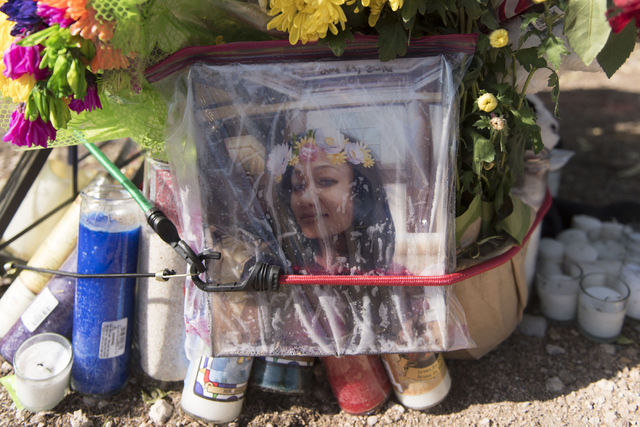Las Vegas mom killed by husband didn’t meet protection order standards, court says
Clark County District Court “is saddened and concerned” about last week’s fatal shootings of five members of the Dej-Oudom family, according to a statement released Wednesday.
Las Vegas police have said Jason Dej-Oudom, 34, killed his wife and their children — Anhurak, 9; Xonajuk, 14; and Dalavanh, 15 — before taking his own life on the night of June 29.
His wife, 35-year-old Phoukeo Dej-Oudom, filed an application for a temporary protection order on June 8, and it was denied without a hearing the following day because it did “not meet statutory requirements,” according to court records.
“With the benefit of hindsight, it is arguable that the TPO should have been ordered,” according to the court’s statement, released by spokeswoman Mary Ann Price. “However, regrettably, the mother did not present facts that would have statutorily warranted the Hearing Master to grant her Protective Order; nor did she appear at a June 22 hearing before a District Judge to obtain her requested relief.”
Domestic Violence Hearing Master Amy Mastin denied the woman’s application without a hearing.
Elizabeth MacDowell, associate law professor and director of the Family Justice Clinic at UNLV’s Boyd Law School, said the fact that Phoukeo Dej-Oudom did not have access to legal help is a crucial failure for the system. A lawyer could have drafted a motion that would have compelled the court to issue the protection order.
“This is a handwritten affidavit written by a woman in distress,” she said. “So often people aren’t able to tell their story clearly.”
According to the court’s statement, the woman’s application did not meet the statutory requirements because many of the incidents she listed “referenced situations in Ohio many years ago between 2000 and 2007 involving the father and guns, but nothing that had recently occurred in Las Vegas.”
“Based upon the information provided by the mother, the Hearing Master determined that the standards outlined in (Nevada’s domestic violence law) were not met.”
Nevada law allows the court to issue a temporary protection order whenever “an act of domestic violence has occurred or there exists a threat of domestic violence.” And statutory definitions of domestic violence and assault include harassment and threats.
The court can hold a hearing if an application is incomplete or more information is needed.
Advocates told the Las Vegas Review-Journal that Family Court officials often deny applications for protection orders when a divorce case is pending. Advocates said officials instead issue no-contact orders, which do not carry criminal penalties for violators, in connection with the divorce case.
The court’s statement did not respond to questions about the practice.
“The mother filed an action for Divorce and a Motion for temporary child custody determination on May 25. She focused her motion on her concern that the father would take the children out of the state,” the statement said. “A hearing was set to hear her motion before the District Judge on June 22; although neither she, nor the father appeared.”
MacDowell said the threats Phoukeo Dej-Oudom described in the application for a protection order are vague at times and do not adequately describe the abuses the woman probably suffered — especially after filing for divorce.
Filing for divorce can be a “huge trigger” in relationships with a history of abuse, MacDowell said. She said it also can add an air of suspicion to applications for protection orders.
“There’s a tendency to suspect it’s part of the gamesmanship of the divorce,” MacDowell said. “Judges just aren’t sure what people are doing at that point.”
The fact that the woman missed the June 22 custody hearing also might have affected her credibility, she said, but the subjective nature of the process makes it hard to say.
“One can debate whether it (the application) met the standard. … The sad thing is, if a different judge read it, they might have found it sufficient to order a hearing,” MacDowell said.
In the divorce complaint, Phoukeo Dej-Oudom marked a box indicating that domestic violence had occurred. Las Vegas police have said the department responded to a domestic violence incident at the family’s home in June but have released no details.
Mastin and other Family Court officials have not responded to interview requests. A request for a copy of Mastin’s contract was denied because personnel records are confidential, Price said.
According to the Nevada Supreme Court’s website, Mastin was appointed to her position as domestic violence hearing master in 2013.
Mastin maintained a private practice focused on domestic issues from 1999 through 2013, except for a couple of years when she was a senior deputy district attorney in the child welfare division. Since her appointment, Mastin has facilitated and participated in severak domestic violence educational courses, according to the Supreme Court’s website.
The statement Price released Wednesday also highlighted the training Family Court officials receive:
“The Domestic Violence Hearing Masters have attended three week-long intensive domestic violence trainings in the last two years, two of which were conducted by the National Judicial College and the other by the National Judicial Institute on Domestic Violence. The Court also meets quarterly with our domestic violence community partners to discuss concerns and ways to improve the Court’s effectiveness.
“The Court mourns the Dej-Oudom family’s loss from this tragedy and will continue to work with our community partners in addressing the far-reaching issue of domestic violence in Clark County.”
Contact Wesley Juhl at wjuhl@reviewjournal.com and 702-383-0391. Find @WesJuhl on Twitter.
RELATED
Mother killed in quadruple murder-suicide of family had quit work, was 'scared for her life'
Vegas woman denied protection order weeks before husband fatally shot her, 3 children
Woman killed in quadruple homicide filed for divorce last month
Family of 5 dead after quadruple murder-suicide in northwest Las Vegas Valley


















